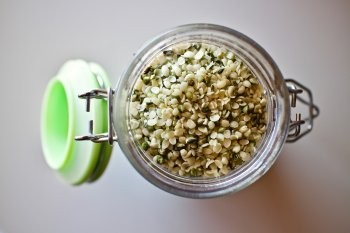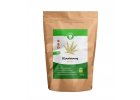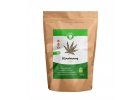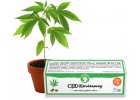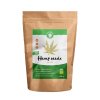Hemp seeds
Hemp seeds are a rich source of protein, unsaturated fatty acids (omega 3, 6 and 9), fibre and minerals, making them a superfood. They have a delicious nutty flavour, making them a healthy addition to cold dishes or cakes. Cannadorra offers both hulled and unhulled, organically grown hemp seeds.
#ShowMore#
How many hemp seeds can we eat daily?
The daily dosage is very similar to nut consumption. One or two tablespoons are enough to meet your daily needs. Due to potential digestive issues, it is recommended to start slowly (one teaspoon per day) and gradually increase the amount. Give your body time to build tolerance to this highly nutritious food. It is also important to consult a specialist about the daily amount or carefully read the recommended dosage on the packaging and not exceed it.
Hemp seeds as an important source of vitamins
Hemp seeds were one of the five grains of ancient China and played a crucial nutritional role during European famines, helping people survive harsh times. Recently, hemp seeds have been rediscovered and are flooding commercial markets. They are rich in antioxidants, high in protein, vitamins, minerals, polyunsaturated fats, and fiber, making them more nutritious than any other edible plant food in the world. The seed shells act as a "natural intestinal brush." Hemp seeds are an excellent all-around nutritional powerhouse.
Nutritional values of hemp seeds
In approximately 40g of hemp seeds, you will find:
- 140% of the daily manganese intake (2.8 mg)
- 22% of the daily iron intake (3.9 mg)
- 75% of the daily magnesium intake (300 mg)
- 34% of the daily zinc intake (5 mg)
- 77% of the daily vitamin E intake (15.4 mg)
- 41% of the daily phosphorus intake (405 mg)
- 7% of the daily copper intake (0.1 mg)
- 2 grams of fiber
- 9.2 grams of protein
- 3.3 grams of carbohydrates
- 12.3 grams of fat
- 161 calories
Why choose organic hemp seeds?
We offer organic-quality seeds grown in ecological agriculture, meaning farming without artificial fertilizers, chemical agents, pesticides, hormones, and artificial substances. The priority is quality, not quantity of production.
How to store hemp seeds?
The best way to preserve the lifespan of hemp seeds after opening the package is to keep them airtight and store them in the fridge or freezer. In a cool and dark environment, they last up to a year. Storing them in an open package at room temperature without an airtight container shortens their lifespan, as it leads to the loss of their fatty acids.
What is the difference between hulled and unhulled hemp seeds?
Unhulled hemp seeds have their shells intact, containing important fiber. However, due to the shell, they are harder, which some people may find difficult to consume. That’s why they opt for hulled hemp seeds, which have the shell removed and are easier to eat.
Learn more: Difference between hulled vs. unhulled hemp seeds.
How can they be consumed? Recipes with hemp seeds
Not only are they very tasty, but their distinct nutty flavor makes them an ideal addition to fresh vegetable salads, cereals, or breakfast grains.
In this form, they are also an amazing protein booster. Many top athletes prefer to consume them raw. Removing the shell means losing some nutritional properties. The shell contains insoluble fiber, which is often missing from our daily diet. Using hemp protein is great, but compared to whole seeds, it means depriving your body of a certain amount of fiber found only in the shells.
Hulled hemp seeds, with their shells removed, can be consumed roasted, raw, or baked. Thanks to their softer texture, they can be added to recipes for bread, dairy substitutes used in baking and cooking, or in confectionery as sweet treats (cakes, fondants, ice creams, etc.). Those with gluten allergies use them as a substitute for breadcrumbs!
Protein bomb
Hemp protein is a fine powder made from pressed whole seeds to remove oil. It’s a protein megahit and an essential ingredient in porridges, cakes, or smoothies.

